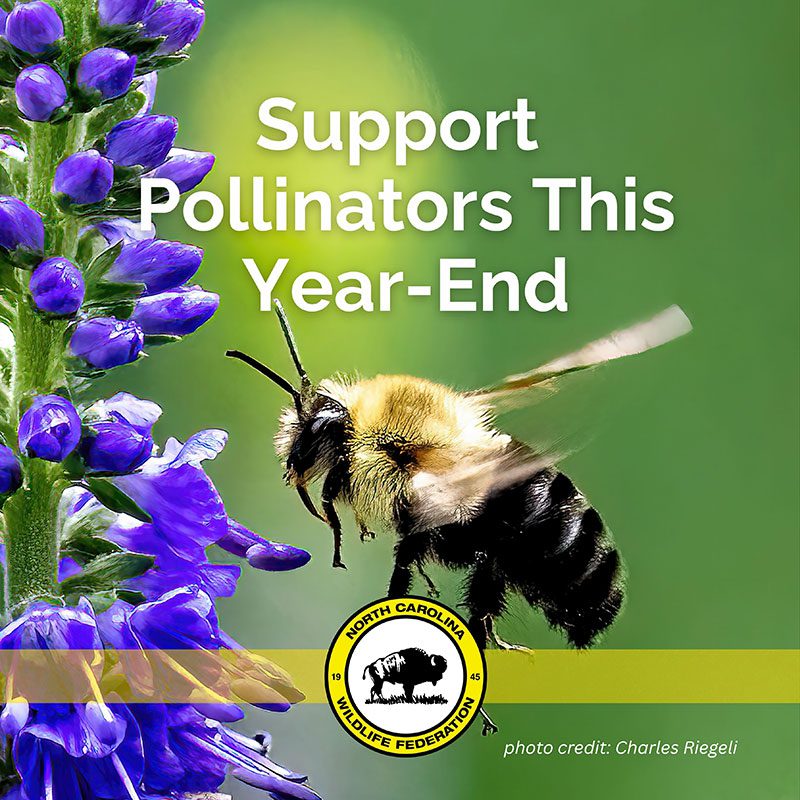Thanks to Our Volunteers! – October 2024 Community Wildlife Chapter Updates
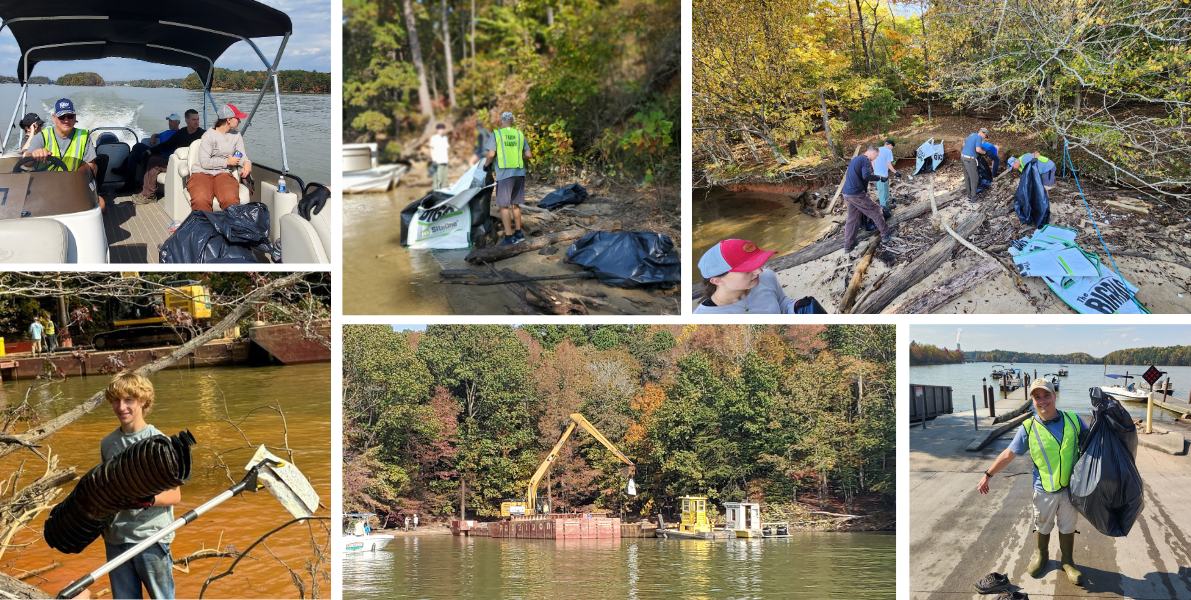
North Carolina Wildlife Federation staff and Community Wildlife Chapter volunteers were in full swing throughout the month of October, they did a whole lot of webinar hosting, engaging kids in nature, wildlife watching, native planting and litter pickups. In October, over 1,170 people were given the opportunity to connect with nature through one of NCWF’s opportunities. This month throughout our great state, 336 native trees and shrubs were installed, and 1,135 native pollinator plants were planted.
Thanks to partners such as the Duke Energy Foundation, Jandy Ammons Foundation, Albemarle-Pamlico National Estuary Partnership and Burt’s Bees for helping make these habitat restoration workdays, educational programs and nature outings possible. Explore our Events Calendar to discover where NCWF and our Community Wildlife Chapters are hosting in-person and virtual events near you. Check out a few highlights below from our conservation outreach team.
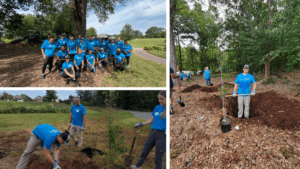
October 4, Robbins Park Tree Planting, NCWF Lake Norman Wildlife Conservationists Chapter continued its partnership with the Town of Cornelius. With the help of 30 Duke Energy volunteers, the chapter planted 70 native trees in Robbins Park in support of NCWF’s Clean & Green program. For every 25 pounds of litter collected, NCWF plants native species all over the state to promote healthy wildlife habitat, mitigate climate change, and buffer stormwater runoff and sediment load in waterways.
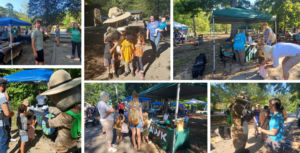
October 5, Kids in Nature Day, NCWF Habitat and Wildlife Keepers Chapter hosted their annual Kids In Nature Day Celebration at Squirrel Lake Park in Matthews. Hundreds of families attended to participate in fishing, nature walks, STEM activities, vendor exhibits, and more. Folks met native animal ambassadors, learned about stormwater runoff, and took home Butterfly Highway seeds. Ranger Rick even showed up for photos, dancing, laughs, and lots of fun!
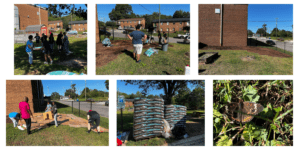
October 5, NCWF Pollinator Garden Prep Workday at the Salvation Army Boys and Girls Club: NCWF and the Salvation Army Boys and Girls Club in Durham partnered for a second garden prep workday to expand the size of the prepped garden. Volunteers freshened up the mulch spread during the first workday and laid down more cardboard and mulch in preparation for a pollinator garden. Special thanks to the Burts Bees Foundation for their support!
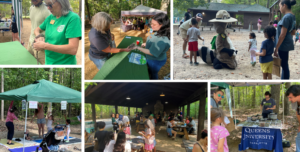
October 6, Kids in Nature Day, NCWF Charlotte Wildlife Stewards Chapter hosted their annual Kids In Nature Day Celebration at Reedy Creek Park in Charlotte. Over 250 children and their families participated in hands-on exploration of all things nature and wildlife. Activities included animal encounters, nature art, animal yoga, guided nature walks, exploring native plants, animal yoga and more. Ranger Rick stopped by for a visit and participants took home all kinds of Ranger Rick prizes for completing their KIND passports!

October 10, DWS Chapter Social: NCWF Durham Wildlife Stewards Chapter held their first event – a chapter social at Glass Jug Beer Lab! Chapter leaders engaged with members of the Durham community and chatted about conservation concerns in the Durham area. The chapter gained more than 20 new supporters and talked with people about their wildlife/conservation interests.
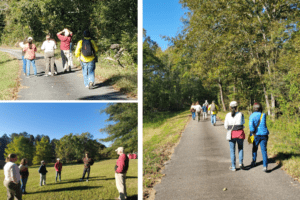
October 12, Bird Walk: Pee Dee NWR, NCWF Union County Wildlife Chapter took ten adults out to Pee Dee National Wildlife Refuge for a guided bird walk with Biologist Anthony Lombardino. Participants encountered over 20 species of birds including red-headed woodpeckers, ruby crowned kinglets, northern flickers, and even the elusive wood thrush and yellow-billed cuckoo!
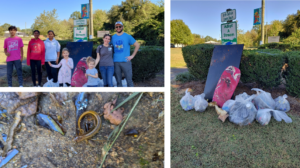
October 12, The Village Greenway and Stream Cleanup, NCWF Concord Wildlife Alliance Chapter took volunteers out to the Village Greenway in Concord. Chapter leaders and volunteers removed litter from the stream and greenway in support of NCWF’s Clean & Green program. In all, participants easily removed over 100 pounds of trash from the area which can cause harm to wildlife like the southern two lined salamander observed during the event.
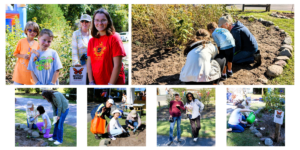
October 12, Dismal Day Planting at Dismal Swamp State Park: NCWF Wildlife Habitat Stewards of Northeastern NC Chapter presented a booth at Dismal Swamp State Park’s Dismal Day celebration where they shared information on the challenges facing native wildlife habitats and offered solutions to combat their rapid decline. Participants were given the opportunity to contribute to pollinator conservation efforts by planting native flowering perennials in the park’s Butterfly Highway pollinator garden.
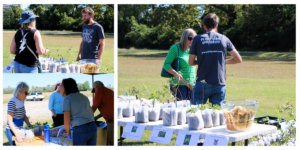
October 13, Fall Native Plant Sale: NCWF Wildlife Habitat Stewards of Northeastern NC Chapter chapter held a native plant sale at the Camden County Library, featuring five species of native flowering perennials and a seed packet containing seven species to help people who want to create their own beneficial pollinator habitats.
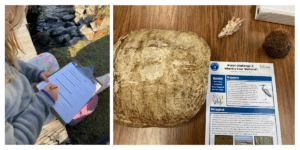
October 15, ecoEXPLORE Ichthyology and Water Badge Check-In: In partnership with Pocosin Lakes NWR and Tyrrell County Library, NCWF presented an ecoEXPLORE program to help youth explore their local wetland habitat and discover fish and subaquatic vegetation in the Scuppernong River.
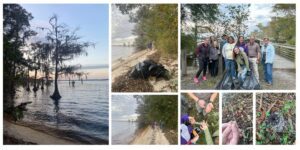
October 15, SSS Lake Waccamaw Nature Walk: The Swamp Stewards met at the Lake Waccamaw Dam to explore the trails around the lake, where they encountered Kingfishers, owls, muscles, Timber rattlesnake skin, buck rubs, mushrooms, tree frogs, toads, animal tracks, and collected 30 lbs of trash.
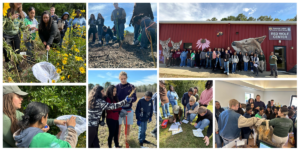
October 17, Pollinator and Red Wolf Program w/ Columbia High School: In partnership with Pocosin Lakes NWR, NCWF hosted students from Columbia High School for an opportunity to learn about Red Wolves and the Red Wolf Recover Program and how to collect and identify pollinators that can be found within our community. After identifying pollinators as a group, the students helped plant over 100 native plants at the new educational pollinator garden at the Millennium Forest.
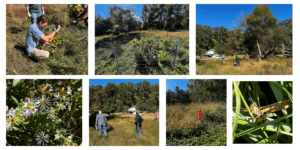
October 17, DWS Rocky Branch Planting Prep: NCWF and the Eno River Association prepared for a joint reforestation workday at ERA’s Rocky Branch conservation area in Durham. On this workday, volunteers unloaded and prepared trays of native trees and shrubs to be planted over the course of the next two workdays and marked where each native plant would go. After a morning of flagging and a quick demonstration on how to properly plant a sapling, everyone planted a native tree.
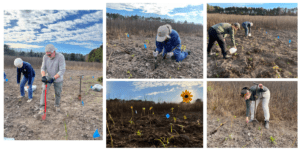
October 17, Educational Pollinator Garden Planting at Millennium Forest: NCWF Wildlife Habitat Stewards of NE NC Chapter and local volunteers teamed up to plant over 500 native perennial plants at the newly established educational pollinator garden in Columbia’s Millennium Forest. This site will serve as a place for education and exploration for the community and visitors as well as provide crucial wildlife habitat.
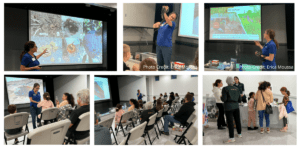
October 17, NRHC Animal Tracks and Signs Program: NCWF Neuse River Hawks Conservationists Chapter held a program about how to spot wildlife from their tracks and other signs. A speaker from the NC Museum of Natural Sciences brought turtle shells, cicada exoskeletons, replicas of animal scat, and snakeskin for kids to touch. She also brought a live black rat snake and Madagascar hissing cockroaches for everyone to look at. Everyone learned about ways to spot signs of animals including their nests, eggs, scat, tracks, holes, and more!
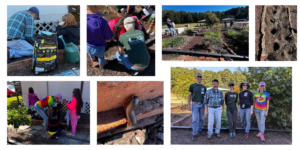
October 18, SWC Adams Elementary Planting Workday: NCWF South Wake Conservationists Chapter and NCWF partnered with Adams Elementary School in Cary to transition their food garden into a native plant and pollinator garden. Adult volunteers and students from five grades helped weed, dig, plant, and water native plants such as swamp sunflower, blue aster, penstemon, and columbine. For many kids, this was their first time planting a plant! The kids also enjoyed digging for critters and looking for pollinators in the garden.
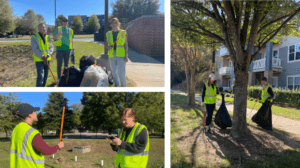
October 19, Help Keep Charlotte Beautiful, NCWF Charlotte Wildlife Stewards Chapter continued their support of the Help Keep Charlotte Beautiful program. Volunteers and chapter leaders removed trash and debris from Tyvola Rd in Charlotte. Nearly 150 pounds of trash were removed from the environment as part of NCWF’s statewide Clean & Green initiative. Volunteers also marked 38 storm drains educating the community about their connection to our waterways.]
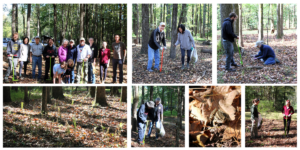
October 19, Merchants Millpond State Park Trail Restoration Project, Part II: NCWF Wildlife Habitat Stewards of Northeastern NC Chapter teamed up with local volunteers to plant over 500 plugs of native grasses along the Coleman Trail at Merchants Millpond State Park. This restoration project provides beneficial habitat for wildlife that call the park home!
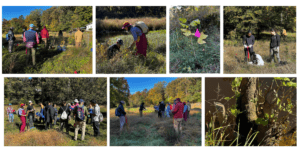
October 19 DWS Rocky Branch Workday 2: On this second of three workdays, NCWF Durham Wildlife Stewards Chapter and the Eno River Association planted native plants and shrubs to reforest an area that previously served as a horse pasture and plant nursery. Volunteers planted and watered over 150 plants representing 16 different species of native plants.
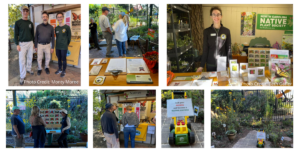
October 21, NCWF Triangle Chapters at the NC State Fair: NCWF and its four Community Wildlife Chapters in the Triangle-area – South Wake Conservationists, Neuse River Hawks Conservationists, Tri-County Conservations, and the Durham Wildlife Stewards – manned a booth for the day at the North Carolina State Fair with the North Carolina Native Plant Society. Chapter leaders from all four local chapters engaged people about native plants, invasive plants, pollinators, and chapter activities.
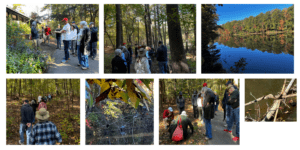
October 23, NRHC Nature Walk at Durant Nature Preserve: NCWF Neuse River Hawks Conservationists Chapter participated in a nature walk led by Tracy Feldman, Assistant Park Manager at Durant Nature Preserve. Along the way, Tracy pointed out the park’s native and invasive plants, and paid special attention to the leaf trails left by leaf mining insects. The group learned about the park’s battle with pollution and trash from local residential areas as well as their struggle with a number of invasive plants, including wisteria and Japanese stiltgrass.
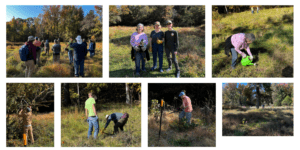
October 24, DWS Rocky Branch Workday 3: On this third and final planting day with NCWF and the Eno River Association, volunteers finished planting the over 350 native plants that helped reforest Rocky Branch. After planting and watering all the saplings that had been put in the ground over the course of three workdays, volunteers helped trim the remaining crepe myrtle and cut back some sweet gum saplings that would have competed with our saplings.
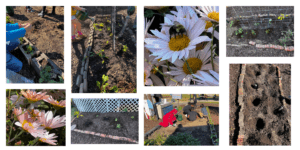
October 25, SWC Adams Elementary Planting Day 2: On this second of two garden workdays, volunteers from SWC, NCWF, and members of the Adams Elementary School PTA finished planting native pollinator plants in the school’s garden. The kids again enjoyed digging, planting, watering, and mulching as well as looking for pollinators. New this week was the addition of native seeds provided by one of SWC’s chapter leaders. Our student helpers learned about the seed heads of native pollinator plants like Anise hyssop, black-eyed Susan, and clasping coneflower and then helped spread these seeds in the garden. We also had the kids help plant rose mallows, Carolina phlox, and purple coneflowers in the remaining flower beds as well as some winter-hard annuals along the cement walkway.
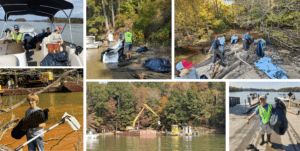
October 26, Hurricane Helene Cleanup Lake Norman, In response to the Hurricane Helene disaster, NCWF lake Norman Wildlife Conservationists Chapter organized a massive cleanup effort on Lake Norman. Over 70 volunteers and 10 boats removed nearly 20 tons of debris from the water and shorelines of the Lake Norman State Park Area with the help from a barge, excavator, dumpster bags and chainsaws. Two miles of shoreline were ridded of the countless threats to wildlife, habitat, water quality, and people!
Written by:

– Page Turner, Conservation Coordinator
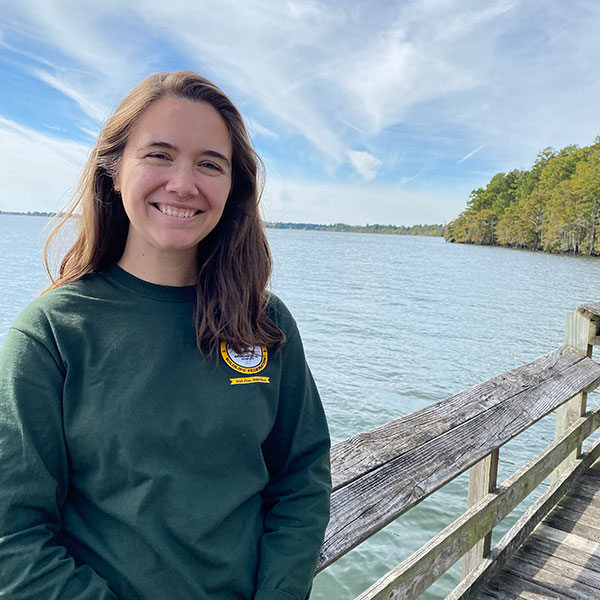
– Laura Frazier, Refuge Conservation Coordinator

– Natalie Bohorquez, VP of Conservation Partnerships
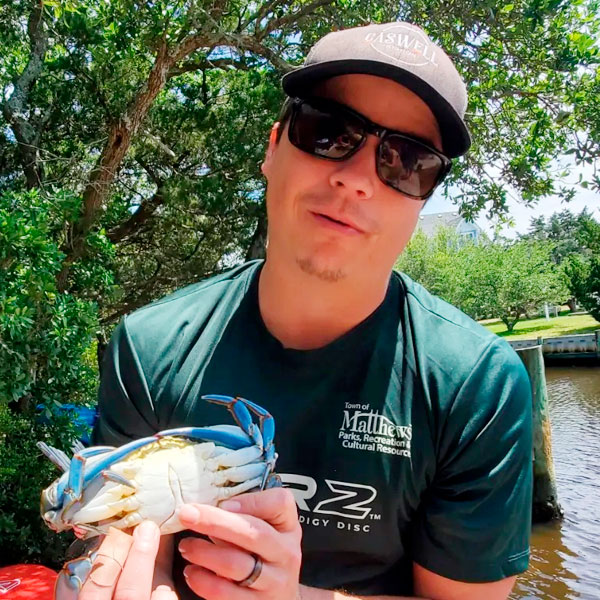
– Alden Picard, Conservation Coordinator

– Kara Solomon, Conservation Coordinator


